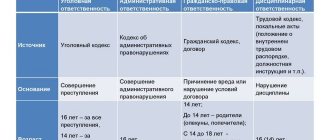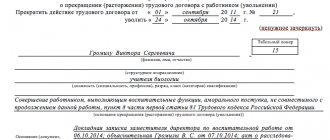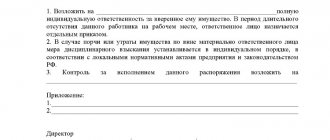What can an employee be punished for?
Employee misconduct is divided into two types - failure to comply with the terms of the employment contract and internal regulations at the enterprise.
According to the contract, a person is accepted to perform certain duties efficiently. During employment, the parties agreed on this and signed an agreement. The personnel officer introduced the newcomer to his job description and internal regulations (IRR) at the enterprise, which clearly described the requirements for compliance with safety regulations, the need for timely completion of management tasks, work and rest hours, the inadmissibility of rude expressions, as well as responsibility for violating all of this.
Here we will also add the provision on keeping trade secrets, technical instructions and other internal regulations that the staff must adhere to.
After reading the documents, the employee signed the introductory sheet and is responsible from that day on. Now if he, for example, is late, he will receive a “discipline” and will not be able to say that he did not know the rules.
How to punish an employee
The types of disciplinary sanctions are clearly described in Art. 192 Labor Code of the Russian Federation. If an employee, through his own fault, has not fulfilled the obligations assigned by the contract, then the following can be applied to him:
- comment;
- rebuke;
- dismissal.
One violation = one punishment.
In general, you can only choose from these three options. The rest, invented by the employer, are illegal. In practice, they cut wages or issue a severe reprimand. There are no such forms in the Labor Code of the Russian Federation, which means they cannot be used.
At the same time, special legislative acts may provide for other types of penalties, for example: a severe reprimand for military personnel, transfer to a lower position or dismissal in connection with a bribe - in internal affairs bodies.
To choose the appropriate punishment, the severity of the offense and the circumstances in which it was committed are assessed. You cannot accuse a person unfoundedly; you need evidence. A disciplinary sanction, even in the form of a reprimand, is formalized by order and certified by the signature of the director. In this case, you need to meet the following deadlines:
- 30 days from the date of discovery of the misconduct (when the immediate superior became aware of it). Disability and vacations are not included here - if the violator is sick, the terms will be extended.
- No later than 6 months. from the date of commission of the offense, and for an audit or inspection - 2 years. This does not include the time of criminal proceedings.
The company decides whether to include the punishment in the employee’s personal file or not. But it is not recorded in the work book (Article 66 of the Labor Code of the Russian Federation): rewards for success are included, but penalties are not.
Features of calculating the period for disciplinary action when a violation is detected
No more than 1 month must pass from the date of discovery of the offense until the penalty is applied.
When determining this period, it should be taken into account that:
- the month period for imposing a disciplinary sanction is calculated from the date of discovery of the offense;
- The day of detection of the misconduct is considered the day when the person to whom the employee is subordinate for work or service became aware of the commission of the misconduct. Regardless of whether the official has the right to impose disciplinary sanctions;
- The monthly period for applying a disciplinary sanction does not include the time the employee is ill, on vacation, or when the employee is absent from work for other reasons, including in connection with the use of rest days (time off), regardless of their duration;
- Leaves that interrupt the course of a month include all leaves provided by the employer (including basic annual leave, additional leave, leave in connection with training, leave without pay).
This follows from paragraph 34 of the resolution of the plenum of the Supreme Court dated March 17, 2004 No. 2 “On the application by the courts of the Russian Federation of the Labor Code of the Russian Federation.”
Remark or reprimand
Such measures are used when the negative consequences are minimal, no one was hurt, no damage was caused to the company or property, and the conflict is completely resolved.
Example 1
The seller Elena left the planning meeting. She responded to the manager’s demand to stay late with obscene language. The boss decided to teach the rude woman a lesson and wrote a report to the store director. She brought witnesses to prove it. Elena violated her job description, which stipulates the obligation to attend meetings, as well as internal regulations, which establish a ban on rude behavior. But since there was no serious damage, she received a warning.
When tardiness, rudeness, and forgetfulness become a habit, a reprimand will be more effective. In general, Art. 192 of the Labor Code of the Russian Federation does not indicate when and what to apply, so the employer chooses the measure himself. A reprimand or reprimand is valid only for a year, after which the punishment is automatically lifted, and there is no need to draw up an order about this.
Dismissal
You can't just fire an employee. The grounds for termination of an employment contract at the request of the employer are clearly listed in Art. 81 Labor Code of the Russian Federation:
- the employee has not passed the certification;
- absenteeism (absent from work for more than 4 hours in a row);
- came drunk, under the influence of drugs or other illegal drugs;
- grossly violated official duties;
- received disciplinary punishment and still did not do the work;
- disclosed commercial (state, official) secrets;
- stole and damaged the property of the organization or colleagues and was sentenced by the court to liability;
- violated labor protection and caused an accident or knowingly created such a threat;
- committed guilty actions related to material values and lost trust;
- did not submit a certificate of income or provided false information (for civil servants under the Law of July 27, 2004 No. 79-FZ “On the State Civil Service...”);
- committed an immoral act (for educational workers);
- made an unreasonable decision that led to damage to the organization’s property (for directors, deputies and chief accountants);
- When applying for a job, he brought false documents.
In addition, when the owner changes, the new owner can appoint his own director, deputy and chief accountant. And when an enterprise is liquidated or its workforce is reduced, the employees are first offered another job. And, if they refused in writing, you can fire them under Art. 74 Labor Code of the Russian Federation.
It is impossible to dismiss an employee on sick leave or on vacation, except in cases of liquidation of the enterprise or termination of activities by an individual entrepreneur.
Punishing an employee: step-by-step instructions
The procedure for applying disciplinary sanctions is set out in Art. 193 Labor Code of the Russian Federation. Let's look at the procedure using a specific example.
Example 2
Lyudmila, a cloakroom attendant at a medical center, left her workplace without warning. As a result, patients were unable to return clothing and were late for appointments. The misconduct was discovered by a senior nurse who received a complaint from citizens. She wrote a report, and now we have to issue a disciplinary punishment.
Commentary on Article 193 of the Labor Code of the Russian Federation
1. To understand the essence of the employee’s action, the employer must obtain an explanation from him in writing. In the explanation, the employee must indicate the reasons for the action and the circumstances under which it was committed. The employee may refuse to explain, which should not be considered an independent disciplinary offense, but may affect the employer’s assessment of the employee’s personality.
If the employee fails to provide an explanation, the employer must draw up a report about this after two working days. It must indicate the calendar date, place and reason for compilation, as well as indicate the witnesses who were present when the employee was asked to provide an explanation and his refusal to do so. The act must be signed by an official of the employer and the witnesses present.
An employee’s refusal to give an explanation cannot be an obstacle to bringing him to disciplinary liability if there is other evidence of an offense (for example, memos from his immediate supervisor) and an act of refusal to give an explanation. They may provide documentary grounds for the application of disciplinary measures.
2. The educational value of a disciplinary sanction is preserved if it is applied directly after the commission of an offense. Therefore, the rule has been established that the penalty must be applied no later than one month from the date of discovery of the offense. The day of discovery must be considered the day when the violation became known to the immediate supervisor of the offending employee. In cases where there is a question of dismissal of an employee for committing theft (including minor) of someone else’s property at the place of work, embezzlement, intentional destruction or damage, the month period will be calculated from the date the court verdict or the act of the body authorized to do so enters into legal force. application of administrative penalties.
The specified period may be increased by:
a) employee illness;
b) he is on vacation;
c) necessary to take into account the motivated opinion of the elected body of the primary trade union organization.
The time of illness of an employee is understood as a period of temporary incapacity for work. The time spent on vacation should be understood as the periods of all vacations provided by the employer to the employee (including educational, in connection with pregnancy and childbirth, as well as those provided without pay). The procedure for taking into account the opinion of the elected body of the primary trade union organization is established by Art. 373 TK.
Other circumstances that seem objective to the employer cannot serve as a basis for extending the period for applying disciplinary sanctions. Thus, by decision of the Supreme Court of the Russian Federation dated May 24, 2002 N GKPI 2002-375, it is recognized as illegal to extend the deadlines for applying disciplinary sanctions to railway transport workers for the period of their stay on passenger and freight trains, as well as for the period of their use of summed rest days .
This position of the legislator and the judiciary is due to the need to protect the interests of the parties to the employment contract. Firstly, the effectiveness of any punishment depends on its efficiency and inevitability. Secondly, the employee should not be under the threat of disciplinary sanctions being applied to him for a long time.
In any case, disciplinary sanction must be applied no later than six months from the date of the offense, and based on the results of an audit, inspection of financial and economic activities or an audit - no later than two years. These deadlines can be extended only for the duration of the criminal case by the bodies of inquiry and investigation.
3. As a general rule, for each disciplinary offense, the employer can apply only one disciplinary sanction provided for by the Labor Code or the charters and regulations on discipline. Along with this, it is possible and necessary to simultaneously bring the employee to property liability (material - according to the norms of labor law or civil liability in the event that his misconduct resulted in property damage). In this case, the rules and deadlines provided for by labor and civil legislation must be observed. Along with disciplinary measures, disciplinary measures may be applied to the employee at the same time. For example, an employee may be reprimanded and deprived of a bonus for the period when labor discipline was violated.
4. As a general rule, the head of the organization exercises the full authority to apply disciplinary measures. At the same time, local regulations may redistribute the competence to bring employees to disciplinary liability between officials of the organization at various levels. For example, the head of a workshop may be authorized to issue comments and reprimands to the workers of the workshop, and the head of a branch or representative office, on the basis of a power of attorney, may have full disciplinary powers, including dismissal of employees for violations of labor discipline. In some cases, the distribution of competence to apply disciplinary measures is carried out centrally. For example, the Charter on the discipline of crews of support vessels of the Navy, approved. Decree of the Government of the Russian Federation of September 22, 2000 N 715, provides that the commander of the ship (captain) can declare a reprimand, reprimand, severe reprimand and warn about incomplete official compliance, and an official who has the right to hire can exercise full disciplinary powers , - commander of a formation of ships or a military unit (clauses 15 and 16 of the Charter).
5. The order (instruction) on punishment is announced to the employee no later than three days from the date of publication against signature. This is necessary to confirm that the employee is familiar with the penalty applied to him. To optimize and record this procedure, it is advisable to include a note on the order (instruction) form itself indicating that the employee has familiarized himself with it. If an employee refuses to sign up for familiarization, then an act is drawn up, similar in form and content to the act of refusal to give an explanation for the fact of committing a disciplinary offense.
6. An employee may not agree with his being brought to disciplinary liability or with the type of penalty applied. In this case, he can appeal the employer’s actions to the state labor inspection authorities or labor dispute resolution authorities. For more information, see Art. Art. 357, 385 - 393 TC and comments to them.
Let's sum it up
- Disciplinary action is voluntary; the law does not oblige the employer to punish employees. You can warn in words, but it has no legal force.
- If you decide to punish, then you need to choose one of the options established by law - reprimand, reprimand, dismissal. Termination of the contract is possible only for specific offenses described in Art. 81 Labor Code of the Russian Federation.
- The collection is valid for a year and is automatically canceled. If the manager allows it, it can be removed early.
Types of sanctions
Art. 192 of the Labor Code of the Russian Federation contains a list of what types of disciplinary sanctions can be applied to employees by the employer:
- Comment.
- Rebuke.
- Dismissal for appropriate reasons.
When punishing an offending employee, one should take into account how serious the violation he committed and the possible consequences of the offense.
The simplest type of penalty is a reprimand. It is imposed for minor offenses that do not have serious consequences (for example, being 10 minutes late from lunch).
More serious - a reprimand. It is used when the offense had or could have consequences for the work process or colleagues of the offender (for example, violation of processing technology and defective products).
The most severe is dismissal. This method of influence is used only on strictly defined grounds set out in Article 81 of the Labor Code of the Russian Federation. Other grounds for dismissal for the purpose of punishment are not allowed and are a violation of current legislation.
In order to study in detail the imposition procedure (the procedure for preparing documentation, the distribution of responsibilities between employees), it is possible to adopt the Regulations on disciplinary sanctions at the enterprise. But it is not allowed to establish penalties other than those listed in Art. 192 Labor Code of the Russian Federation.








